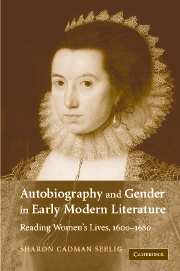Book contents
- Frontmatter
- Contents
- Preface
- Introduction: mapping the territory
- 1 Margaret Hoby: the stewardship of time
- 2 The construction of a life: the diaries of Anne Clifford
- 3 Pygmalion's image: the lives of Lucy Hutchinson
- 4 Ann Fanshawe: private historian
- 5 Romance and respectability: the autobiography of Anne Halkett
- 6 Margaret Cavendish: shy person to Blazing Empress
- Conclusion: “The Life of Me”
- Notes
- Bibliography
- Index
1 - Margaret Hoby: the stewardship of time
Published online by Cambridge University Press: 22 September 2009
- Frontmatter
- Contents
- Preface
- Introduction: mapping the territory
- 1 Margaret Hoby: the stewardship of time
- 2 The construction of a life: the diaries of Anne Clifford
- 3 Pygmalion's image: the lives of Lucy Hutchinson
- 4 Ann Fanshawe: private historian
- 5 Romance and respectability: the autobiography of Anne Halkett
- 6 Margaret Cavendish: shy person to Blazing Empress
- Conclusion: “The Life of Me”
- Notes
- Bibliography
- Index
Summary
The diary of Lady Margaret Hoby is the earliest, and in many ways the least fully developed of the texts I consider; at times simply a sketch of her daily activities and religious observance, it is at the other end of the scale from the narratives with which I conclude this study. For the historian as well as the literary scholar, diaries are very useful sources of information about social conditions, attitudes, and actions. But Margaret Hoby's text, for all that it may convey about the life of a woman of her era, is both strangely resistant as a source of information and yet persistently and curiously intriguing. Since Hoby's diary is so different from anything that might bear that title today, it raises important questions about genre itself. I want to consider what this text tells us, in the most direct and factual of terms, and, equally fascinating, what it withholds.
Margaret Hoby, born to Thomasine and Arthur Dakins in 1571, received her education in the strongly Puritan household of the Countess of Huntingdon. She was married three times: first at the age of eighteen to Walter Devereux, brother of Robert, Earl of Essex; second, after his death in 1591, to Thomas Sidney, brother of Sir Philip Sidney and Mary Sidney, Countess of Pembroke; and finally, after Sidney's death in July 1595, to Sir Thomas Posthumous Hoby, who had been an eager suitor four years earlier.
- Type
- Chapter
- Information
- Autobiography and Gender in Early Modern LiteratureReading Women's Lives, 1600–1680, pp. 15 - 33Publisher: Cambridge University PressPrint publication year: 2006
- 1
- Cited by



